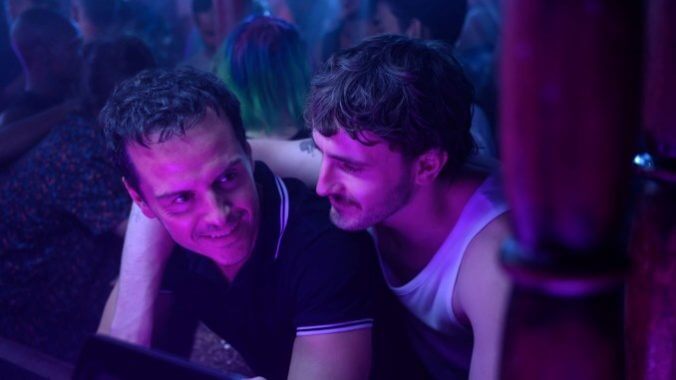Andrew Haigh Takes a Clear-Eyed Look at Lasting Heartbreak in All of Us Strangers

Andrew Haigh’s previous film, the 2017 indie drama Lean On Pete, lays bare the loneliness and desperation of an economically disadvantaged young man who becomes fixated on taking care of an old racehorse. In All of Us Strangers, Haigh makes clear that loneliness need not confine itself to physically desolate landscapes. The solitary, melancholy Adam (Andrew Scott) seems reasonably well-off, though he insists to his neighbor Harry (Paul Mescal) that he’s not a particularly rich or famous type of writer. Still, he can afford a nice apartment in a London high-rise where, still, he feels removed from the world. For the moment, he and Harry appear to be the only tenants in the new building, and Adam’s job does afford him the ability to spend his days at home, alone. He only meets Harry when the younger man knocks on his door in a flirtatious, drunken stupor, assuming (correctly) that Adam is also gay.
Adam is working on a screenplay inspired by his childhood years, which has him thinking about one likely reason contributing to his loneliness: His parents both died in a car crash when he was only 12. Seeking to reconnect with his roots, Adam is drawn back to his old neighborhood, a train ride away from London, and is surprised yet somehow not exactly shocked at what he eventually finds: His father (Jamie Bell) and mother (Claire Foy), living in their old house, just as he remembers it. He is aware of the strangeness, and so are his parents; they understand that they have not been with Adam all these years, and that their renewed time with him may be limited, subject to disappear at any moment. The reunited family tries not to focus on this, instead having tea and catching up with Adam’s adult life.
-

-

-

-

-

-

-

-

-

-

-

-

-

-

-

-

-

-

-

-

-

-

-

-

-

-

-

-

-

-

-

-

-

-

-

-

-

-

-

-








































